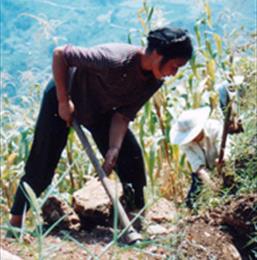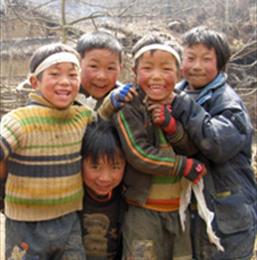Apr/May 2003
31st May 2003
Beginning with this issue, DORS newsletters will give information on a particular theme, as well as project progress and organisational news. If you have any requests for more information on particular aspects of community development in Sichuan please let us know on info@dors.org.uk. The theme for this newsletter is micro-credit.
Micro-credit
Micro-credit became a popular method used in poverty alleviation after being pioneered by the Grameen Bank in Bangladesh. By providing access to small loans, households to expand and diversify their sources of income, which can give them income security, and can help lift them out of subsistence level. The Chinese government began to focus on micro-credit in the mid-late 1990s. DORS began its first micro-credit project in July 1997 with small loans to women in Sugu Village. This was followed by micro-credit projects in 6 other villages.
Loans to women
The DORS micro-credit scheme began experimentally with significant design input from women loanees. The different experiments included variations from 12 repayments over one year to one yearly payment, loan sizes ranging from RMB 500-3000 (GBP 41.6 - 250) group formation guaranteeing loans and individual loans, repayment and loaning dates varying to accommodate agricultural and livestock cycles, and differing levels of involvement of village leaders in loan disbursement and collection.
DORS loans are for productive use, but not for yearly agricultural inputs. Before the loan is disbursed the loanee is interviewed and must explain what she wants to use the loan for, and how she plans to repay it. Loans are only made to women. When all women in a group/village repay in full, further loans can be made to the group. Loan size may be increased upon discussion with loaners.
DORS has not experimented with savings schemes as income is seasonal, and produce is often sold only when cash is needed for purchases/fees. DORS long-term aim is to hand over management to a local agency, not yet identified.
Cheng Feng Qiong lives in Hamlet 8 of Moduo Village. During the first cycle of loan in her hamlet in March 2001, she was chosen by four other women to be the head of their small group and to manage and be responsible of this group. With her loan of RMB 1000, (GBP 83) she bought pigs and pigs feed. On the two repayment dates for that first cycle, her group repaid on time, she was able to notify them and make sure that all the four other women repaid. During the second cycle of loan in April 2002, she was chosen again to be responsible for a group of five women and once more loaned RMB 1000, with which she bought pigs. She considered her project to be successful and was pleased that she was able to repay on time (on both repayment dates) and that her group was the first group to hand their loans back. She was proud of her group and her management skills and happy that this project has been beneficial to her household.
In general repayment rates have been high. Where repayment have been late, the most often stated reasons are: household economic problems (death, illness or sickness, hospital bills, accident, use of loans to buy agricultural related needs: fertilisers, seeds etc), project problems (loan not enough to generate income, input costs too high, project failed when livestock die), personal consumption (use of loan for personal items for household necessities), external problems (market fluctuations, transportation problems, not getting paid for migrant or factory labour, drought affecting crop harvest), perception problems (some participants see loans as aid for poverty alleviation and not as a means to increase the financial situations, therefore sometimes do not repay).
Over last 6 years, DORS have made loans to 950 women in 7 villages. Two locations are now on their 4th loan cycle, Juetuo Village and Banyang Village Hamlet 4, 6 and 8 loaned only once, as repayment rates were lower or repayment too slow. Repayment rate for completed loan cycles is 89 %. In total, RMB 923,100 (GBP 76,925) has been loaned out.
Butter bean loans
A second form of micro-credit is loans to households for production of dabaidou (butter beans). The first cycle of this type of loans started with Wanping village in 2001, where 40 villagers in 3 hamlets borrowed a total of RMB 15,600 (GBP 1,300). In that same year, this project was expanded to Chalin Village and a total of 15 people loaned RMB 7500 (GBP 625). One aim of this project is to encourage reinvestment of agricultural profits to build up the production base. This is a pilot project and the second cycle of loan in Chalin has started this year, with a total of RMB 7000 (GBP 583) to 14 households. In Huodi Village loans to two hamlets last year, were successfully repaid this year, and further loans made to the entire village, 77 households a total of RMB 47,800 (GBP 3,983).
DORS news and information
On 12th May, a meeting was held by Hanyuan County Government, to establish a working group for managing foreign funded projects. Representatives of all the townships where DORS has projects, and all departments that DORS cooperates with attended the meeting. Copies of DORS newsletters, annual review and financial summary were distributed, and DORS staff gave an update on DORS work and methodology, and suggested some specific ideas to improve co-operation between DORS and government departments. Hanyuan government promised more support and co-operation in the future. It was stressed that DORS is assisting Hanyuan Government and the relevant departments in their task of poverty alleviation, and departments should assist DORS in doing so. A person from each government department was assigned to liase with DORS.
Rita Bonomally, Office Manager/Project Officer attended the Anti-poverty and Development conference in Guiyang, organised by the Guizhou Community-based Conservation and Development Research Centre, and the Sichuan NGO network meeting in Chengdu, organised by Conservation International.
DORS has written and sent its interim reports to Kadoorie Charitable Foundations and Misereor, and its annual report to MRDF. Annual charity accounts and report have been prepared.
DORS staff held a 1-day strategic planning meeting, as an update to the last one held in August 2001. The purpose of the meeting was to clarify our goals and review our progress towards them over the past 18 months. The meeting gave us the opportunity to critically examine our performance and discuss ways of maximising our impact in a changing developmental context. If you would like the minutes from this meeting, please email us at info@dors.org.uk.


